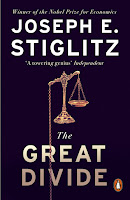 Staff review by Chris Saliba
Staff review by Chris SalibaJoseph Stiglitz explains why inequality is not only bad for the poor, but for the economy as a whole.
Through his writings economist Joseph Stiglitz has been an indefatigable campaigner for equality. Not just economic equality, but also political equality. As he shows many times over in The Great Divide, the American rich have much more political clout. Their economic power means they have a disproportionate influence on government policy: they get to set the rules on taxation, regulation and distribution of resources. Yet ultimately this may be self-defeating. As the poor and middle-classes have their income further eroded, their spending power is reduced. The rich, on the other hand, don't spend a great proportion of their income. They simply have more money than they can spend. As wages are reduced, and more money goes to the top 1%, aggregate demand in the economy is reduced. With no one able to buy much, the whole economy is threatened. Equality is in our best interests. It allows everyone to reach their full potential and contribute their skills and ideas, which is a further boon to economic activity.
The Great Divide consists of Joseph Stiglitz's essays and articles from the last decade, written for such publications as Project Syndicate, Vanity Fair, The New York Times, Washington Monthly and Harper's Magazine. In wonderfully lucid prose devoid of technical jargon, Stiglitz explains complex economic ideas in a way that is easy for the lay reader to grasp. After reading Stiglitz's essays, the fog that passes for so much economic discourse is lifted and the real choices available to us come into focus.
While most of the writing in The Great Divide concerns itself with the American economic and political system, its lessons are widely applicable. As a champion of fairness and democracy, you can go no further than this excellent collection.
The Great Divide, by Joseph Stiglitz. Published by Penguin. ISBN: 9780141981222 RRP: $26.99
To sign up for our monthly newsletter, featuring new releases, book reviews and favourite articles from around the web, click here.
No comments:
Post a Comment